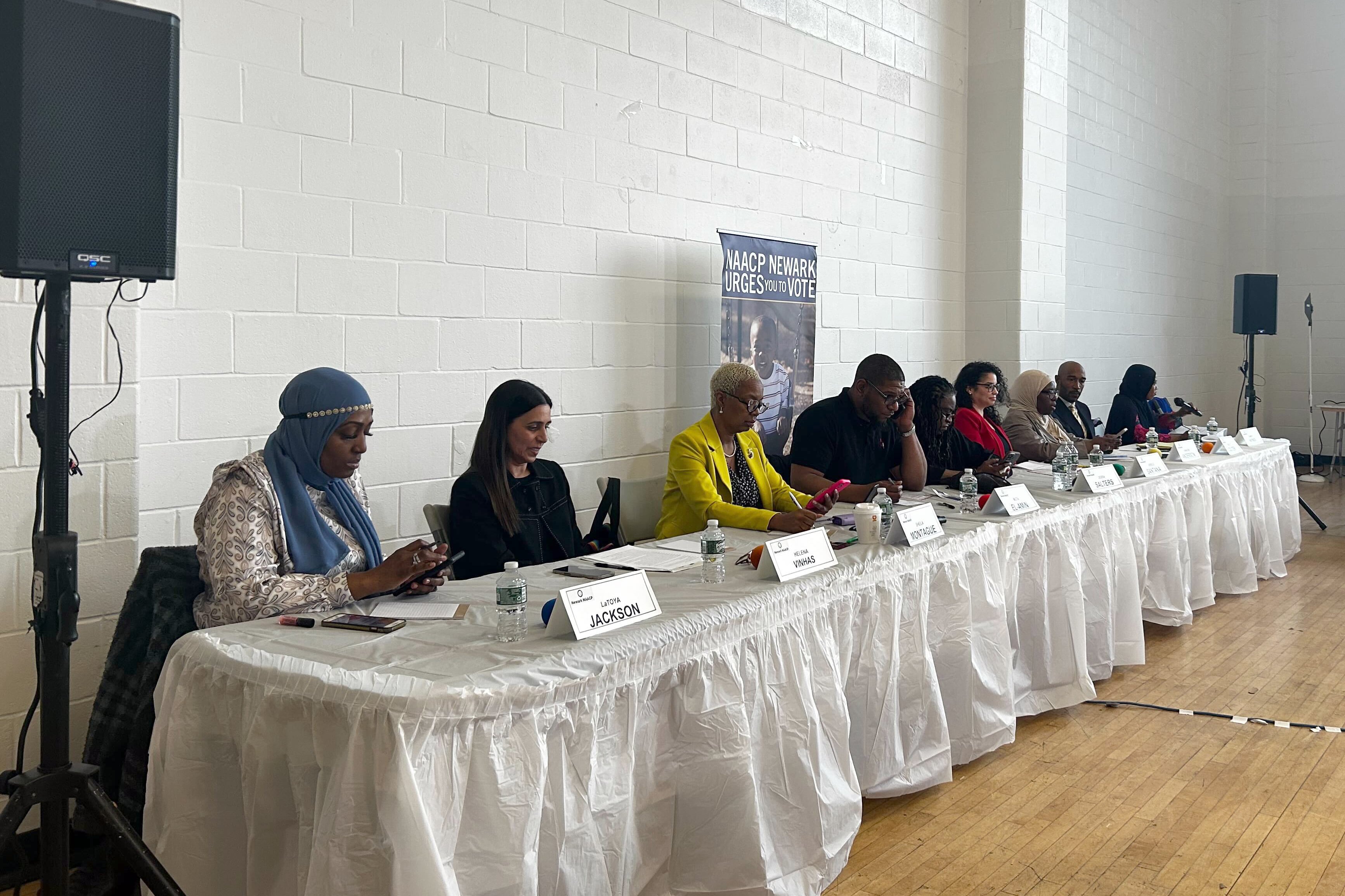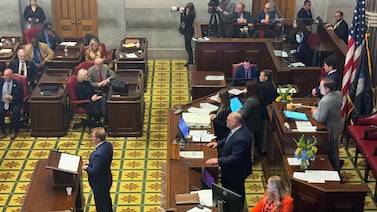Sign up for Chalkbeat Newark’s free newsletter to keep up with the city’s public school system.
Parent engagement, curriculum, and school equity dominated a school board candidate forum for New Jersey’s largest district.
During the two-hour forum, candidates answered questions about which Newark Public Schools policies they would revise or enact, strategies to tackle academic learning loss, and how they would use the record-high state aid proposed in Gov. Phil Murphy’s budget, among other questions.
The event, organized by the Newark branch of the National Association for the Advancement of Colored People, began with opening statements and questions from moderators Kaleena Berryman, the executive director of the Newark Youth Career Pathways program, and Ali McBride Jr., chair of the civic engagement committee of the Newark NAACP. Toward the end of the event, a small group of residents disrupted the evening and objected to the lack of community questions. Police arrived to ease tensions between the group and volunteer organizers.
Ten candidates are running for four seats, including one who is running for an unfinished one-year term left by former board president Asia Norton. Four are incumbents, four have run before, and two are newcomers. Returning candidate Jimmie White was not at Thursday’s forum.
Candidates discuss district policies, curriculum, diversity
The first question the moderator asked was about which district policies the candidates would revise.
Latoya Jackson, a former beauty salon owner turned full-time community advocate and two-time school board candidate, said she wants an open-door policy for parents who want to visit their children at school. Her son has a disability, and she said she had sometimes been denied access to his school.
Returning candidate Che J.T. Colter is running alongside newcomer Muta El-Amin on the “It Takes a Village” slate, a duo of parents and advocates. Colter, the father of a ninth grader, wants to focus on improving program and instruction policies that impact student learning. He wants more intervention for students struggling in math and reading.
Sheila Montague, a returning candidate and educator, pointed to third-grade scores on the state’s English language arts test that showed only 19% of public school third-graders reached proficiency levels for the second year in a row. She said she wants to address the issue and incorporate more phonics-based learning into the curriculum. Last fall, the district introduced new approaches to teaching phonics and implemented explicit writing strategies.
First-time candidate Debra Salters, who ran in the 2021 general election for New Jersey General Assembly District 29 and works with Newark teens, said she would revise the district’s harassment, intimidation, and bullying policy to encompass racial harassment and equity. She referred to student claims of racist harassment at the Newark School of Global Studies that raised questions about how the district handled those allegations.
Co-vice president Dawn Haynes is one of the longest-serving board members and is running for reelection along with Vereliz Santana and newly appointed board members Helena Vinhas and Kanileah Anderson on the “Moving Newark Schools Forward” slate.
Haynes also raised concerns about the district’s equity policy and school diversity issues that “keep coming up.” She also noted the school board’s work to rebuild programs and curriculums that were removed while the district was under state control. The state returned local control to the Newark district in 2020.
“Let’s not forget that the state had control of our schools for 25 years. We are building and driving the plane at the same time,” added Haynes during the forum, which was held at The Clubhouse community center in the Central Ward.
Newark students raise questions about student advocacy
Science Park High School juniors Nathaniel Esubonteng and Breanna Campbell each posed one question to the candidates during the forum. The Newark city council unanimously approved an ordinance in January to lower the voting age to 16 for school board elections, but students won’t be voting this April because of state and county delays in getting voter registration machines ready.
Esubonteng and Campbell asked candidates what inspired them to run and how they would learn about student needs. Anderson, who has a daughter with a disability and was recently appointed to the board in January, said she wants to see all high school student government association presidents convene regularly to discuss the biggest student problems and present them to board members.
El-Amin, a newcomer running with Colter, said he was inspired to run after he found out his children were failing math and English language arts last year. He runs the community center at Bradley Court, a public housing complex that he said needs more city services, youth, and community engagement.
“This triggered an alarm system that went off in my head. I as a father have to do something. I as a community advocate have to do something,” said El-Amin, who joined the Newark Community Street Team’s safe passage to schools initiative to help city teens.
Santana, who is running for reelection, said the state legislature should revise the funding formula used to calculate aid to school districts and account for inflation and cost of living. Although the district is slated to get a record-high $1.25 billion in aid for next school year, those dollars “are just going to supplant what federal dollars have been funding,” Santana added.
Federal COVID relief funds sent to school districts are set to expire this fall, and those dollars have been funding the district’s academic programs such as after-school and summer programs, Saturday school, and tutoring, Santana said.
During the forum, returning and new candidates also expressed their concern about the “Moving Newark Schools Forward” slate, which garners support from state and local leaders like Mayor Ras Baraka and Senate Majority Leader M. Teresa Ruiz every year. The slate has won every election since 2016. Seven current board members were part of that slate.
Vinhas, who is of Portuguese descent and the mother of two public school students, said she would advocate for more services and resources for English language learners and immigrant families trying to navigate the public school system.
Montague wants to involve parents in board decisions about school curriculums and policies. She also wants to see new members on the school board who are not backed by the mayoral slate that has historically won every election since 2016.
“The most important issue is that we remove politics from the education of our children,” Montague added.
The forum was disrupted when a small group of residents arrived at the end of Haynes’ closing remarks. One resident, who claimed he was the chairman of the new Black power movement in Newark, asked why community residents could not ask candidates a question. McBride tried to address the concerns, but the conversation became volatile. After the police arrived to calm those in the audience, the remaining candidates gave their closing remarks.
NAACP Newark president Deborah Smith Gregory addressed the crowd and said residents were not given an opportunity to ask questions because the event was designed to allow the community to hear from the candidates.
City residents can vote in person on April 16 at their designated polling location or vote by mail if they register for that option seven days before the election. Ballots must be postmarked no later than April 16 and received by the Essex County Board of Elections no later than six days after polls close on election day.
Residents can watch the NAACP Newark candidate forum in full on the organization’s Facebook page.
Jessie Gómez is a reporter for Chalkbeat Newark, covering public education in the city. Contact Jessie at jgomez@chalkbeat.org.







